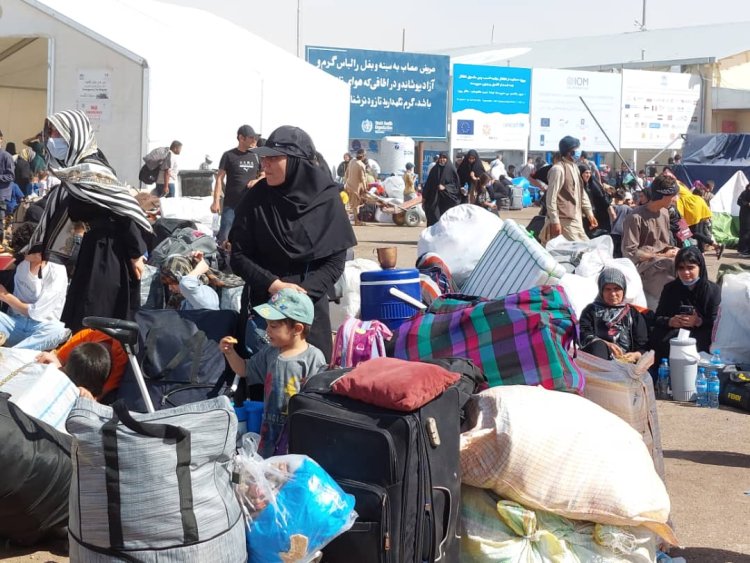Forced Deportation: Families Express Concern Over Girls’ Education

As the forced deportation of Afghan refugees from Iran and Pakistan continues, returning families express growing concerns over the educational future of their daughters.
They say that upon returning to Afghanistan, women and girls face an uncertain future, with limited access to education and job opportunities making life even more difficult.
Abdul Ghafoor, originally from Ghazni, returned to Afghanistan two weeks ago with his family of ten after living in Iran for 17 years. His three daughters had completed up to 8th, 9th, and 12th grade while living there.
However, their forced deportation from Iran and the Taliban’s ongoing ban on girls’ education have thrown their academic future into question.
“My daughters had planned to pursue higher education and return to serve their country after gaining professional skills,” he says. “But suddenly, the deportation process began. Their education was cut short, and now the Taliban are preventing them from continuing their studies.”
Abdul Ghafoor fears that his daughters—and many other Afghan girls—may permanently lose their right to education, as there are no signs of schools reopening for girls under Taliban rule.
“Since we returned, my daughters ask me every day, ‘Father, when will our schools reopen?’ I can only give them empty promises. If girls are not allowed to study, their future will be in jeopardy,” he adds.
He calls on the Taliban to lift the ban on girls' education so that both the future of Afghan girls and the country can be bright.
Shafiqullah, another returnee who arrived in Kabul a week ago with his family, shares similar concerns. In addition to struggling with the lack of shelter and numerous other challenges, he is deeply worried about the future of his two daughters and three sons, who had all been studying in Iran.
Due to his old age, Shafiqullah is unable to work and had pinned all his hopes on the education and future success of his children. Now, however, with their forced return and the Taliban’s restrictions on education, he sees their future as uncertain and troubling.
“We lived in Iran for 13 years,” he explains. “My daughters had studied up to the 8th and 9th grade. When we returned, they cried, saying we had come to a place where they would no longer be allowed to go to school. I’m very worried because if they can’t continue their education, their future will be ruined.”
He adds that his daughters returned from Iran without any academic documents and are now deprived of education due to the Taliban’s restrictions.
To ease their psychological burden, Shafiqullah plans to enroll his daughters in religious schools or vocational training centers.
“They’re facing despair, but I’m trying to find a way out of this situation,” he says.
At the same time, many female students who have returned from Iran and Pakistan have been left without access to schools and universities due to the ban on girls’ education. They now face both psychological distress and an uncertain future.
Sabrina Ahmadi is one such student. She returned to Kabul from Pakistan five months ago. According to her, her family was forced to return due to pressure from Pakistani police. She had completed 10th grade in Pakistan but has since been unable to continue her education because of the Taliban’s restrictions.
“It was extremely difficult for me to stop my education halfway through,” she says.
To cope with the psychological stress and keep her educational journey somewhat alive, she has turned to short-term courses and vocational training, which she sees as her only option.
“The pressure increases day by day,” Sabrina says. “Many girls are suffering from psychological trauma. We still don’t know whether we’ll ever be allowed to study again.”
She and many other female students now wait in hope that opportunities for continuing their education will eventually reappear.
As the deportation of Afghan refugees from Iran and Pakistan intensifies, the Afghan Women’s Freedom Movement has condemned the forced returns, warning that they will deprive thousands of girls of their right to education.
The movement has called on the United Nations and human rights organizations to pressure the Taliban into guaranteeing girls’ right to education and to stop the process of forcibly returning refugee families.
Meanwhile, Rosa Otunbayeva, the UN Secretary-General’s Special Representative in Afghanistan and head of UNAMA, has expressed deep concern about the country's low literacy rates and overall state of education. She noted that only 50% of Afghan men and just 20% of women can read and write.
Since the Taliban's return to power, girls above the sixth grade have been banned from attending school, universities have been closed to women, and sweeping restrictions have been placed on women's employment, movement, and participation in society.
